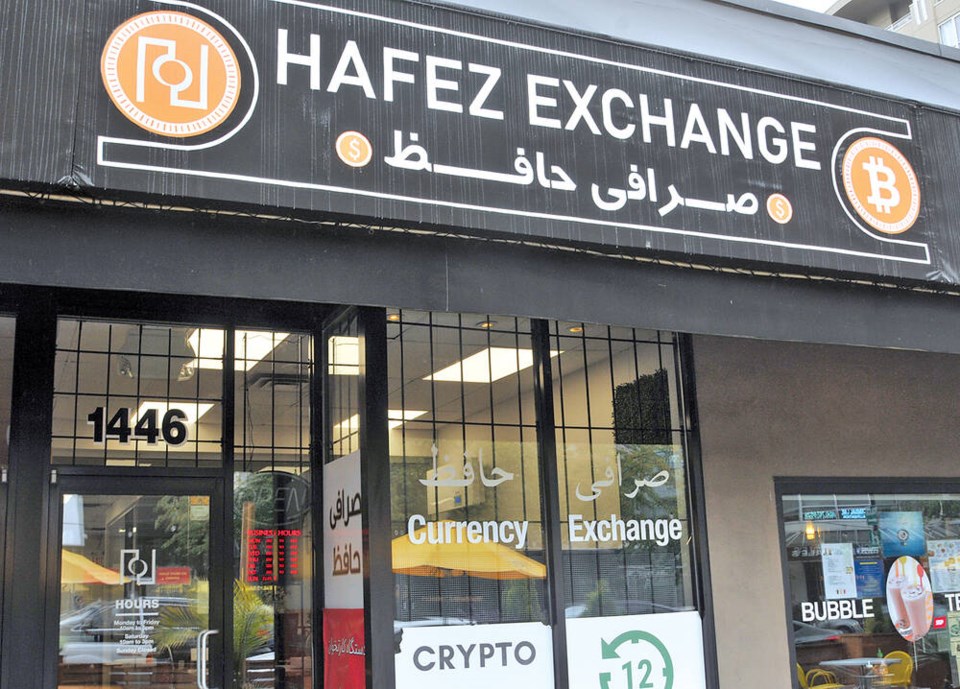The City of North Â鶹´«Ã½Ó³»has banned any new
Under , the 28 existing money service businesses (or MSBs) will be allowed to stay where they are, but new ones will be required to move into commercial spaces off the ground level or seek a rezoning.
Currency exchanges community, who cannot use traditional banks to send or receive money from family or businesses in Iran due to government sanctions against the Islamic Republic.
But the city has been facing calls to rein in the rapidly growing MSB sector, which some on council say is taking up too much prime retail space without providing the street animation and vibrancy the city wants. District of West Â鶹´«Ã½Ó³»council passed its earlier this year.
Council’s vote followed a public hearing at which some existing currency exchange operators spoke against the ban, even though it would give them a competitive edge.
Mehdi Fardad, chief operating officer of an MSB, said the ban has the impact of segregation, unfairly targeting his community.
“Let’s remember why these newcomers chose Canada and North Â鶹´«Ã½Ó³»specifically. Many have fled an oppressive regime, persecution and intolerance, seeking Canada as a safe haven where they can retain their culture, identity, becoming a valuable part of the community, rebuilding their lives and contributing into your economy,” he said.
Matt Usborne, a chief compliance officer for an existing MSB and former financial fraud investigator for the government, attested to the stringent regulations the businesses face. He also called out council for considering a bylaw that targets one ethnic group when so many other businesses like salons and dentists don’t face the same “vibe check.”
“These suggested restrictions imply that these businesses, and by extension, the people who use them, are somehow undesirable or problematic. This is divisive, plain and simply unacceptable, and, at worst, culturally and racially insensitive,” he said. “I must say that as a Canadian, I expect better. I expect respect for diversity we hold so near and respect that we should have a regulated free market economy where demand is met with supply. There’s a demand for these businesses. The demand is met with supply.”
North Â鶹´«Ã½Ó³»resident Adrian Mak, who recently produced a , urged council to go ahead with the ban, although he said it should be on the understanding that the city will eventually bring in a broader strategy when it comes to deciding which businesses can set up shop and where.
“What really surprised me was how many of my friends, acquaintances, family and complete strangers have messaged me about this and how they had all been feeling exactly the same way,” he said. “Now, do I think this is a perfect solution? Absolutely not. I think that a more encompassing plan needs to be made for the long term.”
Council votes on first-floor currency exchange ban
Mayor Linda Buchanan and Couns. Angela Girard and Jessica McIlroy opposed the ban, urging fellow council members to instead include regulation of MSBs in the city’s pending Lonsdale Great Street Project, which aims to revitalize the commercial spine of the city.
“I think it focuses attention on one business type and not in a positive way. And sadly, I believe another unintended consequence is making our community look at this particular type of business in a way that it’s not valuable or not really wanted here,” Girard said. “I really believe that we need to be reminded that these businesses are serving our local economy, both in terms of those who are relying upon this essential service, and also for the people that it’s employing.”
The majority though – Couns. Don Bell, Shervin Shahriari, Holly Back and Tony Valente – said council must act quickly. The Great Street Project isn’t due to be finished for another year and a half.
As a refugee from Iran 40 years ago, Shahriari said he was sensitive to the needs of the Persian community but he said council’s motion presents a good compromise.
Bell, who moved the motion, agreed.
“We’re just saying they shouldn’t be on the street level, where they detract, in my opinion, from the walkability and the activity on the street,” he said. “We’ve seen at least an apparent significant increase in the number of MSBs over the last few years and I’m concerned that that is happening, and I would like to see that slowed down so that we have a chance to determine, particularly at street level, whether there’s a need for more.”



